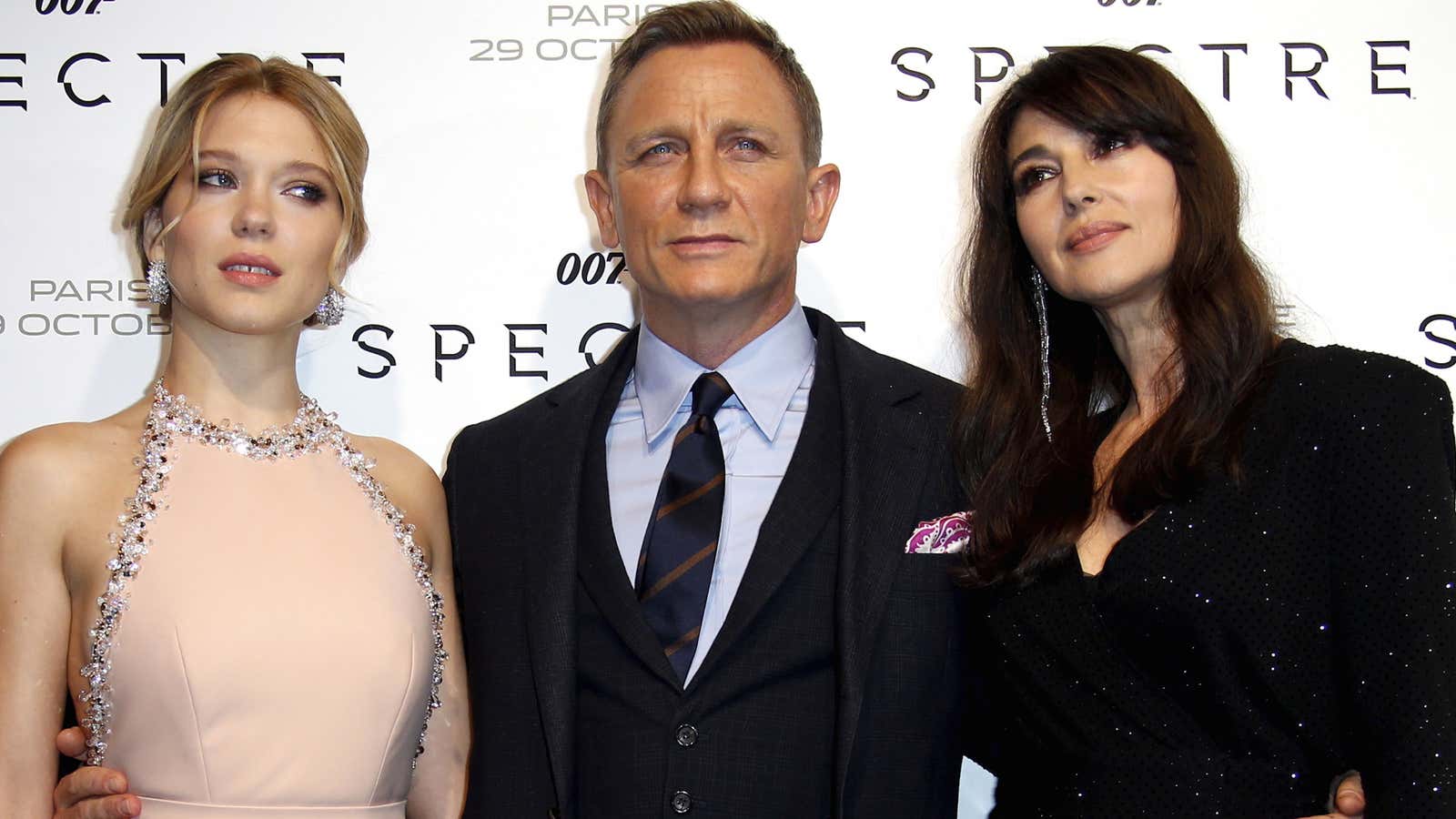“You think of women as disposable pleasures, rather than meaningful pursuits,” Vesper Lynd tells James Bond in Casino Royale (2006).
Vesper, played by Eva Green, is describing the character of James Bond, the person. But she could as easily be discussing the ethos of the franchise. For decades, women in Bond films have become a brand: “Bond girls.” They’re sexy, they’re seduceable, they aid Bond—and sometimes (as with Honor Blackman’s Pussy Galore) they do all three. But whatever they’re function, Bond girls exist for Bond and the (presumed) male viewer, never for themselves.
As the world flocks to theaters for the latest (and presumably last) installment of the Daniel Craig Bond this weekend, it’s worth taking a moment to remember the Craig-era Bond girl who almost broke the mold.
Vesper Lynd was different. She knew that Bond expected his women to be “disposable pleasures,” but she wasn’t going to play along. Casino Royale, Craig’s first Bond outing, is a fairly typical film in the series until Vesper shows up. Eva Green, not Craig, is what truly makes the film catch fire.
Their first encounter on a train replaces the typically corny, smug Bond one-liners with screwball-comedy levels of dexterous banter. You really need to see the scene to experience the power of these two beautiful people engaged in grand-master level flirting, but even on the page their dialogue is joyously sharp.
VL: So as charming as you are, Mr. Bond, I will be keeping my eye on our government’s money—and off your perfectly-formed arse.
JB: You noticed?
VL: Even accountants have imagination. How was your lamb?
JB: Skewered! One sympathizes.
VL: Good evening, Mr. Bond.
JB: Good evening, Ms. Lynd.
The reason the relationship is able to sparkle isn’t just that the two are colleagues (a trope going back at least to Agent Triple X, played at the time by Barbara Bach, in The Spy Who Loved Me). Rather, this relationship is different because Vesper is presented as being interesting—here is a woman as glamorous, as fascinating, as quick, and as in control as Bond is.
Whenever Bond tries to turn Vesper into a Bond girl, she turns it around on him. For instance, when Bond presents her with breath-taking dress to wear, and she responds by giving him a perfectly tailored suit. She’s there to dress up for him, but he’s also there to dress up for her. Vesper is not a disposable pleasure. Her perspective matters—and it matters so much that she becomes the objectifier as much as the objectified.
Sadly, such female independence cannot last. Vesper ultimately betrays Bond (though trying to save him) and is punished for it. With her death, she ceases to be a person in her own right, and becomes a motivation for Bond’s brooding, angst and violence in the sequel Quantum of Solace.
Death begetting bloody retribution is hardly an original move. In 1969‘s On Her Majesty’s Secret Service, the murder of Bond’s lover provides our hero with a similar opportunity for personal revenge at the beginning of the follow-up, Diamonds Are Forever (1971).
When not being used as an excuse for revenge, assorted Bond girls have also been offed in order to show the ruthlessness of this or that villain. From Jill Masterton’s (Shirley Eaton) infamous death by gold paint in 1964 to Miss Fields’ (Gemma Arterton) demise after being covered in oil in 2006, dead female bodies have been as important to the Bond mystique as live ones.
No woman is free from the Bond girl curse—in 2012’s Skyfall, even Judi Dench’s M was transformed into tragic Bond backstory via convenient assassination.
The depressing thing about Vesper Lynd’s character is she proved there is another way. Bond could be sexy, exciting, fun, and suspenseful with a non-interchangeable leading lady, someone whose personality mattered as much as her dress size.
In fact, it’s quite possible that the Bond franchise would be even sexier, and generally better, with a real, honest-to-goodness female lead. Casino Royale has Bond fall in love with Vesper and decide to retire; he can only funciton as a killer if he’s a loner, supposedly. But earlier in the film, he and Vesper seem to work perfectly well together, whether she’s teaching him the wonders of dinner attire or (literally) jump starting his heart to prevent him going into cardiac arrest.
It’s not so hard to imagine an alternate series of Daniel Craig-led Bonds, in which Eva Green stayed on as the love interest, and the series explored the Nick and Nora possibilities of stylish flirtation and teamwork, rather than the same old landscape of monotonous, broody vengeance.
Not sold on a domesticated Bond? What if, Vesper had instead become a colleague or even a supervisor, refusing to sleep with Bond—or sleeping with him once and then breaking it off. James Bond doesn’t seem like the type to shy away from some extra sexual friction.
Unfortunately, the filmmakers, and presumably the financial backers, lack that flexibility and vision. Casino Royale has since proven to be a one off. Bond has gone back to being Bond. Eve Moneypenny (Naomi Harris) flirts with him in Skyfall and Spectre, but is clearly a subordinate. Madeleine Swann (Léa Seydoux) in Spectre is checks the boxes under “strong female character” with an air of bland obligation.
In an Esquire interview ahead of Spectre, Craig mused that he hoped his version of the character was “not as sexist and misogynistic” as earlier versions. He pointed out that “the world has changed.” And there’s no doubt that at least the Craig iteration is more contemporary than the Connery rape fantasies, or Moore’s smug lechery.
The Craig films have offered perhaps the best female roles in the series. But they’ve also demonstrated that when a woman becomes too interesting or too central in a James Bond film, she, like all her predecessors before her, still has to die.
